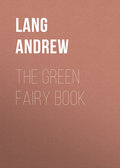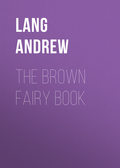
Lang Andrew
Tales of Romance
PART XII
ROBIN AT COURT
"Have you any green cloth," asked the King, "that you could sell to me?" and Robin brought out thirty yards and more, and clad the King and his men in coats of Lincoln green. "Now we will all ride to Nottingham," said he, and they went merrily, shooting by the way.
The people of Nottingham saw them coming, and trembled as they watched the dark mass of Lincoln green drawing near over the fields. "I fear lest our King be slain," whispered one to another, "and if Robin Hood gets into the town there is not one of us whose life is safe"; and every man, woman, and child made ready to fly.
The King laughed out when he saw their fright, and called them back. Right glad were they to hear his voice, and they feasted and made merry. A few days later the King returned to London, and Robin dwelt in his Court for twelve months. By that time he had spent a hundred pounds, for he gave largely to the Knights and Squires he met, and great renown he had for his open-handedness.
But his men, who had been born under the shadow of the forest, could not live amid streets and houses. One by one they slipped away, till only Little John and Will Scarlett were left. Then Robin himself grew home-sick, and at the sight of some young men shooting, he thought upon the time when he was accounted the best archer in all England, and went straightway to the King and begged for leave to go on a pilgrimage to Bernisdale.
"I may not say you nay," answered the King, "seven nights you may be gone and no more." And Robin thanked him, and that evening set out for the greenwood.
It was early morning when he reached it at last, and listened thirstily to the notes of singing birds, great and small.
"It seems long since I was here," he said to himself; "it would give me great joy if I could bring down a deer once more;" and he shot a great hart, and blew his horn, and all the outlaws of the forest came flocking round him. "Welcome," they said, "our dear master, back to the greenwood tree," and they threw off their caps and fell on their knees before him in delight at his return.
PART XIII
THE DEATH OF ROBIN HOOD
For two and twenty years Robin Hood dwelt in Sherwood Forest after he had run away from Court, and naught that the King could say would tempt him back again. At the end of that time he fell ill; he neither ate nor drank, and had no care for the things he loved, "I must go to merry Kirkley," said he, "and have my blood let."
But Will Scarlett, who heard his words, spoke roundly to him. "Not by my leave, nor without a hundred bowmen at your back. For there abides an evil man, who is sure to quarrel with you, and you will need us badly."
"If you are afraid, Will Scarlett, you may stay at home, for me," said Robin, "and in truth no man will I take with me, save Little John only, to carry my bow."
"Bear your bow yourself, master, and I will bear mine, and we will shoot for a penny as we ride."
"Very well, let it be so," said Robin, and they went on merrily enough till they came to some women weeping sorely near a stream.
"What is the matter, good wives?" said Robin Hood.
"We weep for Robin Hood and his dear body, which to-day must let blood," was their answer.
"Pray why do you weep for me?" asked Robin; "the Prioress is the daughter of my aunt, and my cousin, and well I know she would not do me harm for all the world."
And he passed on, with Little John at his side.
Soon they reached the Priory, where they were let in by the Prioress herself, who bade them welcome heartily, and not the less because Robin handed her twenty pounds in gold as payment for his stay, and told her if he cost her more she was to let him know of it.
Then she began to bleed him, and for long Robin said nothing, giving her credit for kindness and for knowing her art, but at length so much blood came from him that he suspected treason.
He tried to open the door, for she had left him alone in the room, but it was locked fast, and while the blood was still flowing he could not escape from the casement. So he lay down for many hours, and none came near him, and at length the blood stopped.
Slowly Robin uprose and staggered to the lattice-window, and blew thrice on his horn; but the blast was so low, and so little like what Robin was wont to give, that Little John, who was watching for some sound, felt that his master must be nigh to death.
At this thought he started to his feet, and ran swiftly to the Priory. He broke the locks of all the doors that stood between him and Robin Hood, and soon entered the chamber where his master lay, white, with nigh all his blood gone from him.
"I crave a boon of you, dear master," cried Little John.
"And what is that boon," said Robin Hood, "which Little John begs of me?" And Little John answered, "It is to burn fair Kirkley Hall, and all the nunnery."
But Robin Hood, in spite of the wrong that had been done him, would not listen to Little John's cry for revenge. "I never hurt a woman in all my life," he said, "nor a man that was in her company. But now my time is done, that know I well; so give me my bow and a broad arrow, and wheresoever it falls there shall my grave be digged. Lay a green sod under my head and another at my feet, and put beside me my bow, which ever made sweetest music to my ears, and see that green and gravel make my grave. And, Little John, take care that I have length enough and breadth enough to lie in." So he loosened his last arrow from the string and then died, and where the arrow fell Robin was buried.
WAYLAND THE SMITH
PART I
Right up to the north of Norway and Sweden, looking straight at the Pole, lies the country of Finmark. It is very cold and very bare, and for half the year very dark; but inside its stony mountains are rich stores of metals, and the strong, ugly men of the country spent their lives in digging out the ore and in working it.
Like many people who dwell in mountains, they saw and heard strange things, which were unknown to the inhabitants of the lands to the south.
Now in Finmark there were three brothers whose names were Slagfid, Eigil, and Wayland, all much handsomer and cleverer than their neighbours. They had some money of their own, but this did not prevent them working as hard as anyone else; and as they were either very clever or very lucky, they were soon in a fair way to grow rich.
One day they went to a new part of the mountains which was yet untouched, and began to throw up the earth with their pick-axes; but instead of the iron they expected to see, they found they had lighted upon a mine of gold.
This discovery pleased them greatly and their blows became stronger and harder, for the gold was deep in the rock and it was not easy to get it out.
At last a huge lump rolled out at their feet, and when they picked it up they saw three stones shining in it, one red and one blue and one green. They took it home to their mother, who began to weep bitterly at the sight of it. "What is the matter?" asked her sons anxiously, for they knew things lay open to her which were hidden from others.
"Ah, my sons," she said as soon as she could speak, "you will have much happiness, but I shall be forced to part with you. Therefore I shed tears, for I hoped that only death would divide us! Green is the grass, blue is the sky, red are the roses, golden is the maiden. The Noras" (for so in that country they called the Fates) "beckon you to a land where green fields lie under a blue sky, fields where golden-haired maidens lie among the flowers."
Great was the joy of the three brothers when they heard the words of their mother; for they hated the looks of the women who dwelt about them, and longed to see the maidens of the south. Next morning they rose early and buckled on their swords and coats of mail, and fastened on their heads helmets that they had made the day before from the lump of gold. In the centre of Slagfid's helmet was the green stone, and in the centre of Eigil's was the blue stone, and in the centre of Wayland's was the red stone; and when they were ready they put their reindeers into their sledges, and set out over the snow.
PART II
When they reached the mountains where only yesterday they had been digging, they saw by the light of the moon a host of little men running to meet them. They were dressed all in grey, except for their caps, which were red; they had red eyes, too, and black tongues, which never ceased chattering.
These were the mountain elves, and when they came near they formed themselves into a fairy ring, and sang while they danced round it; —
Will you leave us? Will you leave us?
Slagfid, Eigil, and Wayland, sons of a King.
Is not the emerald better than grass?
Is not the ruby better than roses?
Is not the sapphire better than the sky?
Why do you leave the mountains of Finmark?
But Eigil was impatient and struck his reindeer, that willing beast which flies like the wind and needs not the touch of a whip. It bounded forward in surprise, and knocked down one of the elves that stood in its path. But the hands of his brothers laid hold of the reins, and stopped the reindeer, and sang again: —
The Finlander's world, the Finlander's joy
Lies under the earth;
Seek not without what we offer within,
Despise not the elves small and dark though they be.
The best is within, do not seek it without.
The Finlander's world, the Finlander's joy,
Lies under the earth.
Slagfid struck his reindeer. It bounded forward and struck down an elf who stood in its road. Then his brothers stood in its path, and stopped the reindeer, and sang: —
Because Slagfid struck his reindeer,
Because Eigil struck his reindeer,
Our hatred shall follow you.
A time of weal, a time of woe, a time of grief, a time of joy.
Because Wayland also forsook us,
Though he struck not the reindeer,
A time of weal, a time of woe, a time of grief, a time of joy.
Farewell, O Finlanders, sons of a King.
Their voices died away as they crossed a bright strip of moonlight, which lay between them and the mountains and so they were seen no more.
The brothers thought no more about them or their words, but went swiftly on their way south, sleeping at night in their reindeer skins.
After many days they came to a lake full of fish, in a place which was called the Valley of Wolves, because of the number of wolves which hid there. But the Finlanders did not mind the wolves, and built a house close to the lake, and hunted bears, and caught fish through holes in the ice, till winter had passed away and spring had come. Then one day they noticed that the sky was blue and the earth covered with flowers.
By-and-by they noticed something more, and that was that three maidens were sitting on the grass, spinning flax on the bank of a stream. Their eyes were blue, and their skins were white as the snow on the mountains, while instead of the mantles of swansdown they generally wore, golden hair covered their shoulders.
The hearts of the brothers beat as they looked on the maidens, who were such as they had often dreamed of, but had never seen; and as they drew near they found to their surprise that the maidens were dressed each in red, green, and blue garments, and the meadow was so thickly dotted with yellow flowers that it seemed as if it were a mass of solid gold.
"Hail, noble princes! Hail, Slagfid, Eigil, and Wayland," sang the maidens.
"Swanvite, Alvilda, and Alruna are sent by the Norns,
To bring joy to the princes of Finmark"
Then the tongues of the young men were unloosed, and Slagfid married Swanvite, Eigil Alruna, and Wayland Alvilda.
PART III
For nine years they all lived on the shores of the lake, and no people in the world were as happy as these six; till one morning the three wives stood before their husbands and said with weeping eyes: —
"Dear lords, the time has now come when we must bid you farewell, for we are not allowed to stay with you any longer.. We are Norns – or, as some call us, Valkyrie. Nine years of joy are granted to us, but these are paid for by nine years during which we hover round the combatants on every field of battle. But bear your souls in patience, for on earth all things have an end, and in nine years we will return to be your wives as before."
"But we shall begetting old then," answered the brothers, "and you will have forgotten us. Stay now, we pray you, for we love you well."
"We are not mortals to grow old," said the Norns, "and true love does not grow old either. Still, we do not wish you to fall sick with grieving, so we leave you these three keys, with which you may open the mountain, and busy yourselves by digging out the treasures it contains. By the time the nine years are over you will have become rich and men of renown." So they laid down the keys and vanished.
For a long while the young men only left their houses to seek for food, so dreary had the Valley of Wolves become. At last Slagfid and Eigil could bear it no longer, and declared they would travel through the whole world till they found their wives; but Wayland, the youngest, determined to stay at home.
"You would do much better to remain where you are," said he. "You do not know in which direction to look for them, and it is useless to seek on earth for those who fly through the air. You will only lose yourselves, and starve, and when the nine years are ended who can tell where you may be?"
But his words fell on deaf ears; for Slagfid and Eigil merely filled their wallets with food and their horns with drink, and prepared to take leave of their brother. Wayland embraced them weeping, for he feared that he should never more see them, and once again he implored them to give up their quest. Slagfid and Eigil only shook their heads. "We have no rest, night or day, without them," they said, and they begged him to look after their property till they came back again.
Wayland saw that more words would be wasted, so he walked with them to the edge of the forest, where their ways would part. Then Slagfid said: "Our fathers, when they went a journey, left behind them a token by which it might be known whether they were dead or alive, and I will do so also." So he stamped heavily on the soft ground, and added, "As long as this footmark remains sharp and clear, I shall be safe. If it is filled with water I shall be drowned; if with blood, I shall have fallen in battle. But if it is filled with earth an illness will have killed me, and I shall lie under the ground." Thus he did, and Eigil did likewise. Then they cut stout sticks to aid their journeys, and went their ways. Wayland stood gazing after them as long as they were in sight, and then he went sadly home.
PART IV
Slagfid and Eigil walked steadily on through the day, and when evening came they reached a stream bordered with trees, where they took off their golden helmets and sat down to rest and eat. They had gone far that day and were tired, and drank somewhat heavily, so that they knew not what they did. "If I lose my Swanvite," said Slagfid, "I am undone. She is the fairest woman that sun ever looked on, or that man ever loved."
"It is a lie," answered Eigil. "I know one lovelier still, and her name is Alruna. Odin does not love Freya so fondly as Eigil adores her."
"It is no lie," cried Slagfid, "and may shame fall on him who slanders me."
"And I," answered Eigil, "stand to what I have said, and declare that you are the liar." At this they both drew their swords and fell fighting, till Slagfid struck Eigil's helmet so hard that the jewel flew into a thousand pieces, while Eigil himself fell backwards into the river.
Slagfid stood still, leaning on his sword and looking at the river into which his brother had fallen. Suddenly the trees behind him rustled, and a voice came out of them, saying, "A time of weal, a time of woe, a time of tears, a time of death"; and though he could see nothing he remembered the mountain elves, and thought how true their prophecy had been. "I have slain my brother," he said to himself, "my wife has forsaken me; I am miserable and alone. What shall I do? Go back to Wayland, or follow Eigil into the river? No. After all I may find my wife. The Norns do not always bring misfortune."
As he spoke a light gleamed in the darkness of the night, and, looking up, Slagfid saw it was shed by a bright star which seemed to be drawing nearer, and the nearer it drew its shape seemed to change into a human figure. Then Slagfid knew that it was his wife, Swanvite, floating just over his head and encircled by a rim of clear green light.
He could not speak for joy, but held out his arms to her. She beckoned to him to follow her, and Slagfid, flinging away his sword and coat of mail, began to climb the mountain.
Half way up it seemed to him as if a hand from behind was pulling him back, and turning he fancied he beheld his mother and heard her say: "My son, seek not after vain shadows, which yet may be your ruin."
The words caused Slagfid to pause for a moment. Then the figure of Swanvite danced before him and beckoned to him again, and his mother was forgotten. There were rivers to swim, precipices to climb, chasms to leap, but he passed them all gladly, till at last he noticed that the higher he got the less the figure seemed like Swanvite.
He felt frightened and tried to turn back, but he could not. On he had to go, till just as he reached the top of the mountain the first rays of the sun appeared above the horizon, and he saw that, instead of Swanvite, he had followed a black elf.
He paused and looked over the green plain that lay thousands of feet below him, cool and inviting after the stony mountain up which he had come. "A time of death," whispered the black elf in his ear, and Slagfid flung himself over the precipice.







